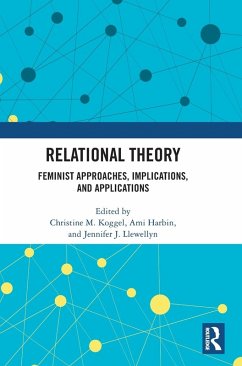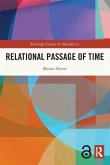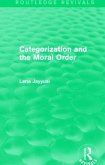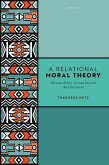Relational Theory
Feminist Approaches, Implications, and Applications
Herausgeber: Koggel, Christine M.; Llewellyn, Jennifer J.; Harbin, Ami
Relational Theory
Feminist Approaches, Implications, and Applications
Herausgeber: Koggel, Christine M.; Llewellyn, Jennifer J.; Harbin, Ami
- Gebundenes Buch
- Merkliste
- Auf die Merkliste
- Bewerten Bewerten
- Teilen
- Produkt teilen
- Produkterinnerung
- Produkterinnerung
This book uses insights from feminist relational theory to outline the ontological, epistemological, and moral/political implications of this theoretical approach. The chapters in this book were originally published in the Journal of Global Ethics.
Andere Kunden interessierten sich auch für
![Relational Political Marketing in Party-Centred Democracies Relational Political Marketing in Party-Centred Democracies]() Helene P. M. JohansenRelational Political Marketing in Party-Centred Democracies58,99 €
Helene P. M. JohansenRelational Political Marketing in Party-Centred Democracies58,99 €![Relational Political Marketing in Party-Centred Democracies Relational Political Marketing in Party-Centred Democracies]() Helene P. M. JohansenRelational Political Marketing in Party-Centred Democracies177,99 €
Helene P. M. JohansenRelational Political Marketing in Party-Centred Democracies177,99 €![Relational Passage of Time Relational Passage of Time]() Matias SlavovRelational Passage of Time54,99 €
Matias SlavovRelational Passage of Time54,99 €![Categorization and the Moral Order (Routledge Revivals) Categorization and the Moral Order (Routledge Revivals)]() Lena JayyusiCategorization and the Moral Order (Routledge Revivals)177,99 €
Lena JayyusiCategorization and the Moral Order (Routledge Revivals)177,99 €![Relational Moral Theory Relational Moral Theory]() Thaddeus MetzRelational Moral Theory93,99 €
Thaddeus MetzRelational Moral Theory93,99 €![Climbing Together: Relational Morality and Meaningful Action in Intercultural Community Engagement Climbing Together: Relational Morality and Meaningful Action in Intercultural Community Engagement]() Anna TaftClimbing Together: Relational Morality and Meaningful Action in Intercultural Community Engagement126,99 €
Anna TaftClimbing Together: Relational Morality and Meaningful Action in Intercultural Community Engagement126,99 €![World, Affectivity, Trauma World, Affectivity, Trauma]() Robert D. StolorowWorld, Affectivity, Trauma160,99 €
Robert D. StolorowWorld, Affectivity, Trauma160,99 €-
-
-
This book uses insights from feminist relational theory to outline the ontological, epistemological, and moral/political implications of this theoretical approach. The chapters in this book were originally published in the Journal of Global Ethics.
Produktdetails
- Produktdetails
- Verlag: Routledge
- Seitenzahl: 340
- Erscheinungstermin: 18. April 2025
- Englisch
- Abmessung: 250mm x 175mm x 23mm
- Gewicht: 767g
- ISBN-13: 9781032974590
- ISBN-10: 1032974591
- Artikelnr.: 72488215
- Herstellerkennzeichnung
- Libri GmbH
- Europaallee 1
- 36244 Bad Hersfeld
- gpsr@libri.de
- Verlag: Routledge
- Seitenzahl: 340
- Erscheinungstermin: 18. April 2025
- Englisch
- Abmessung: 250mm x 175mm x 23mm
- Gewicht: 767g
- ISBN-13: 9781032974590
- ISBN-10: 1032974591
- Artikelnr.: 72488215
- Herstellerkennzeichnung
- Libri GmbH
- Europaallee 1
- 36244 Bad Hersfeld
- gpsr@libri.de
Christine M. Koggel is Professor of Philosophy at Carleton University, Ottawa, Canada. She was co-lead editor of the Journal of Global Ethics from 2018 to 2023. Ami Harbin is Associate Professor of Philosophy and Women and Gender Studies at Oakland University, Rochester, USA, and the author of Disorientation and Moral Life (2016). Jennifer J. Llewellyn is Professor of Law and Chair in Restorative Justice at the Schulich School of Law at Dalhousie University, Halifax, Canada. She is also Director of the Restorative Research, Innovation and Education Lab (www.restorativelab.ca).
Introduction: feminist relational theory 1. Toward a relational theory of
harm: on the ethical implications of childhood psychological abuse 2.
Reframing patient-doctor relationships: relational autonomy and treating
autonomy as a virtue 3. Thinking through the death of migrants crossing the
Mediterranean Sea: mourning and grief as relational and as sites for
resistance 4. Crafting relations and feminist practices of access 5.
Global health and the COVID-19 pandemic: a care ethics approach 6. Is the
capability approach a sufficient challenge to distributive accounts of
global justice? 7. The relationship between poverty and prosperity: a
feminist relational account 8. The coloniality of time in the global
justice debate: de-centring Western linear temporality 9. The moral fabric
of linguicide: un-weaving trauma narratives and dependency relationships in
Indigenous language reclamation 10. Relational value, land, and climate
justice 11. Safety and sacrifice 12. Revealing invisible inequalities in
egalitarian political theory 13. Protection as connection: feminist
relational theory and protecting civilians from violence in South Sudan
14. Integrating peace, justice and development in a relational approach to
peacebuilding 15. 'Re-existence' of women Cambodian religious leaders:
decolonial possibilities using insights from feminist relational theory and
postsecular feminism 16. Towards an ethics of compassionate care in
accompanying human suffering: dialogic relationships and feminist activist
scholarship with asylum-seeking mothers 17. Connecting relational wellbeing
and participatory action research: reflections on 'unlikely'
transformations among women caring for disabled children in South Africa
18. Transnational solidarity in feminist practices: power, partnerships,
and accountability
harm: on the ethical implications of childhood psychological abuse 2.
Reframing patient-doctor relationships: relational autonomy and treating
autonomy as a virtue 3. Thinking through the death of migrants crossing the
Mediterranean Sea: mourning and grief as relational and as sites for
resistance 4. Crafting relations and feminist practices of access 5.
Global health and the COVID-19 pandemic: a care ethics approach 6. Is the
capability approach a sufficient challenge to distributive accounts of
global justice? 7. The relationship between poverty and prosperity: a
feminist relational account 8. The coloniality of time in the global
justice debate: de-centring Western linear temporality 9. The moral fabric
of linguicide: un-weaving trauma narratives and dependency relationships in
Indigenous language reclamation 10. Relational value, land, and climate
justice 11. Safety and sacrifice 12. Revealing invisible inequalities in
egalitarian political theory 13. Protection as connection: feminist
relational theory and protecting civilians from violence in South Sudan
14. Integrating peace, justice and development in a relational approach to
peacebuilding 15. 'Re-existence' of women Cambodian religious leaders:
decolonial possibilities using insights from feminist relational theory and
postsecular feminism 16. Towards an ethics of compassionate care in
accompanying human suffering: dialogic relationships and feminist activist
scholarship with asylum-seeking mothers 17. Connecting relational wellbeing
and participatory action research: reflections on 'unlikely'
transformations among women caring for disabled children in South Africa
18. Transnational solidarity in feminist practices: power, partnerships,
and accountability
Introduction: feminist relational theory 1. Toward a relational theory of
harm: on the ethical implications of childhood psychological abuse 2.
Reframing patient-doctor relationships: relational autonomy and treating
autonomy as a virtue 3. Thinking through the death of migrants crossing the
Mediterranean Sea: mourning and grief as relational and as sites for
resistance 4. Crafting relations and feminist practices of access 5.
Global health and the COVID-19 pandemic: a care ethics approach 6. Is the
capability approach a sufficient challenge to distributive accounts of
global justice? 7. The relationship between poverty and prosperity: a
feminist relational account 8. The coloniality of time in the global
justice debate: de-centring Western linear temporality 9. The moral fabric
of linguicide: un-weaving trauma narratives and dependency relationships in
Indigenous language reclamation 10. Relational value, land, and climate
justice 11. Safety and sacrifice 12. Revealing invisible inequalities in
egalitarian political theory 13. Protection as connection: feminist
relational theory and protecting civilians from violence in South Sudan
14. Integrating peace, justice and development in a relational approach to
peacebuilding 15. 'Re-existence' of women Cambodian religious leaders:
decolonial possibilities using insights from feminist relational theory and
postsecular feminism 16. Towards an ethics of compassionate care in
accompanying human suffering: dialogic relationships and feminist activist
scholarship with asylum-seeking mothers 17. Connecting relational wellbeing
and participatory action research: reflections on 'unlikely'
transformations among women caring for disabled children in South Africa
18. Transnational solidarity in feminist practices: power, partnerships,
and accountability
harm: on the ethical implications of childhood psychological abuse 2.
Reframing patient-doctor relationships: relational autonomy and treating
autonomy as a virtue 3. Thinking through the death of migrants crossing the
Mediterranean Sea: mourning and grief as relational and as sites for
resistance 4. Crafting relations and feminist practices of access 5.
Global health and the COVID-19 pandemic: a care ethics approach 6. Is the
capability approach a sufficient challenge to distributive accounts of
global justice? 7. The relationship between poverty and prosperity: a
feminist relational account 8. The coloniality of time in the global
justice debate: de-centring Western linear temporality 9. The moral fabric
of linguicide: un-weaving trauma narratives and dependency relationships in
Indigenous language reclamation 10. Relational value, land, and climate
justice 11. Safety and sacrifice 12. Revealing invisible inequalities in
egalitarian political theory 13. Protection as connection: feminist
relational theory and protecting civilians from violence in South Sudan
14. Integrating peace, justice and development in a relational approach to
peacebuilding 15. 'Re-existence' of women Cambodian religious leaders:
decolonial possibilities using insights from feminist relational theory and
postsecular feminism 16. Towards an ethics of compassionate care in
accompanying human suffering: dialogic relationships and feminist activist
scholarship with asylum-seeking mothers 17. Connecting relational wellbeing
and participatory action research: reflections on 'unlikely'
transformations among women caring for disabled children in South Africa
18. Transnational solidarity in feminist practices: power, partnerships,
and accountability









